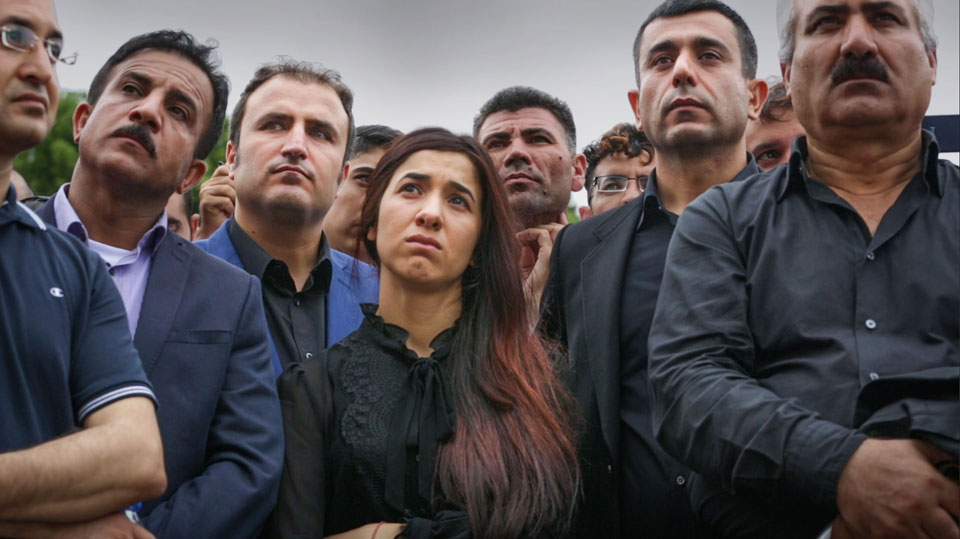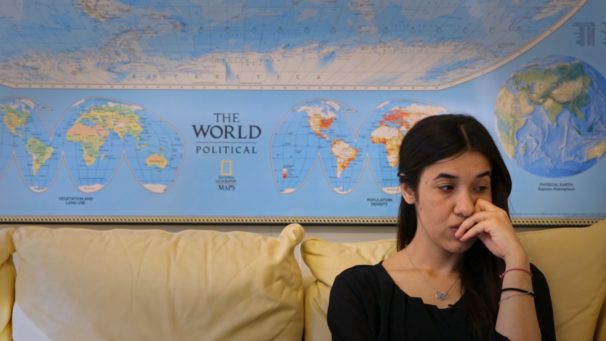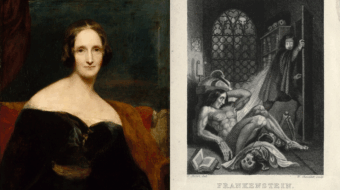
Nadia Murad is a young woman who, after escaping the life of forced sex slavery by the terrorist group ISIS, went on to become a voice for the countless Yazidi girls who did not make it out, the thousands of Yazidi men who were killed, and the Yazidi community in Northern Iraq who survived genocide in 2014.
Murad’s memoir, The Last Girl: My Story of Captivity, and My Fight Against the Islamic State, was published in 2017. In early October 2018, she and Denis Mukwege of the Democratic Republic of the Congo were jointly awarded the Nobel Peace Prize for “their efforts to end the use of sexual violence as a weapon of war and armed conflict.” She is the first Iraqi to be awarded a Nobel prize.
The documentary On Her Shoulders, filmed over a period of two years before she won the Nobel, follows Murad’s advocacy tour to get concrete policies passed to rectify the horrors done to her people. It’s a harrowing tale of someone who wanted a normal life but chose to answer a call of duty for justice. What makes the documentary stand out is that it also serves as a subtle exposé of the media circus—and political theatrics—that clutter the terrain of modern-day advocacy work. It looks behind the curtain of sensationalized media headlines and politician sound bites, to showcase a complex space in which Murad exists, and fights, in order to have her voice heard.
Since 2014 Nadia has lived a life torn asunder by war and hate. In that year ISIS declared that the Yazidi people of Northern Iraq were against Islam, and went on to kill an estimated 5000 Yazidi people, capturing over 7000 women and children, and forcing them to become either sex slaves or child soldiers. Nadia was kidnapped from her village and made to be a sex slave for three months before being smuggled out of Iraq and brought to Germany as a refugee in 2015.
Nadia’s mother and six brothers were murdered. Eighteen members of her family were either killed or enslaved. Nadia has been made to tell the gruesome details of this story over and over again in the hopes of political leaders of the world listening and doing something about the attack on her community. As Nadia points out at the beginning of the documentary, what she does, in speaking in front of diplomats, governments, and councils is not a job to her, but a request for help. Yet, as the film displays, it is a hard task for Nadia to push through public relations pleasantries and photo-ops with politicians, in order to get real decisions made concerning a community that has come to see her as their hope for their future.
Director Alexandria Bombach (Frame By Frame) layers the film by focusing on two major themes. First, she allows Nadia to tell her story and her inner thoughts to the camera while allowing the viewer to get a glimpse into the life she now lives. This creates a connection with the audience that helps us see Nadia as more than just an unscathed symbol of hope and strength. It allows viewers to experience the pressure and vulnerability this young woman also faces as a voice for something beyond herself.
Bombach could have painted Nadia’s story in a linear fashion, having gone through hardship in 2014, and now the perfect picture of strength and resilience in 2016 when Bombach began filming. Instead, Nadia’s journey is shown as one of ebbs and flows, of progress and setbacks, of optimism and skepticism, that paints a more truthful and resonating picture of an activist who is human and complex. The title of the movie is apt: Much is placed on Nadia’s shoulders, and we are allowed to witness how she manages her burden.
The second theme that Bombach chooses to focus on, and one not always seen in films such as this, is the role that media, public figures and politicians play in Nadia’s journey, and the overall effects they have on positive change. Throughout the film, Nadia is positioned to relate details of her sexual assault countless times. Each time she is emotional, having to relive those moments and that pain over and over again in the hope that someone in power will listen, and offer aid to the now displaced Yazidi people of Northern Iraq. Each time she is thanked for her strength to tell her story, and treated as something of a celebrity, but Nadia makes it clear that notoriety is not what she’s looking for. She’s looking for justice for her community.
Bombach does a fine job of showcasing Nadia’s uncomfortable moments doing countless photo-ops and tours within government buildings that serve largely as political theatre, rather than concrete steps toward real solutions. Sensationalized headlines flash across the screen during the film that focus solely on Nadia and her ordeal as a sex slave, rather than her ultimate goal of wanting the United Nations to launch an investigation into the crimes ISIS has committed.
Viewers are allowed to see Nadia’s frustration with the line of media questions she receives. We are shown where Nadia is coached on what to say and focus on, and how she pushes to make her speeches authentic rather than empty words. She is almost made to “sell” her pain in a marketable package in order to persuade the world’s leaders to listen and act. It is a concept that should make the viewer uncomfortable, as it does Nadia. During a scene where Nadia was made to smile and take a photo in a large government chair, I found myself grumbling, “She doesn’t want a pretty picture in an old chair, she wants policies and concrete change!”
At 94 minutes, the film offers a glimpse into the world in which Nadia now exists, and the world that modern advocacy work has become. On her heavy journey much is at stake, but it is not presented as completely hopeless. Although Bombach showcases the at times absurd and aimless way politics and mainstream media can function, she also allows Nadia to explain that the work is necessary and that she does believe it will ultimately lead to some positive change. The film in that sense avoids the pitfall of wallowing in despair and pessimism and rather plays up an authentic journey interwoven with hope. Murad’s Nobel Peace Prize now clearly lifts her struggle and that of her people onto a new level of global attention.
Oscilloscope Laboratories released On Her Shoulders on Oct. 19 in New York and will release it on Weds., Oct. 24 in Los Angeles, with a national rollout to follow.
The trailer can be seen here.










